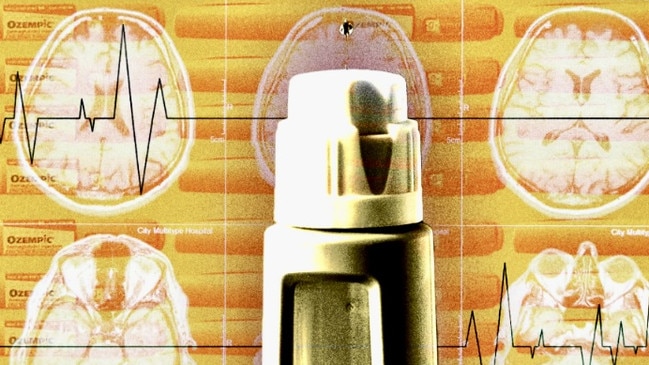Ozempic could transform brains as well as waistlines
The weight-loss drug’s effect on habits from smoking to nail-biting shows its wider powers.

It began with anecdotes. There were the people taking Ozempic for type 2 diabetes who found that they no longer craved the cigarettes that had caused that diabetes. There were those using the drug to treat their weight loss who reported that as well as wanting smaller portions of food at dinner, they were also satisfied with a smaller glass of wine alongside.
Nail biters, according to some accounts, stopped biting. Compulsive shoppers felt less compulsion. One man complained to his doctor that when he went fishing he no longer felt the need to drink 18 lagers. He was, he lamented, “No fun at the beach.”
It seemed like Ozempic was not just changing their bodies. In some sense it was changing their minds.
Then came the studies. In laboratories rats were given various addictions – the full range of human vices – then given the new class of weight-loss drugs. They stopped being junkies – or, at the very least, were less dedicated rodent junkies.
In humans, data is starting to come through too. Just this week, a study found that those with diabetes taking Ozempic were significantly less likely to seek treatment for tobacco- use disorder.
The trials are at an early stage, mainly observational, and some are ambiguous. But taken together, tentatively, they point in the same direction.
“We are seeing really positive findings,” said Sue Grigson, from Penn State University, who has conducted research showing that the new class of weight-loss drugs appear to help in opioid addiction.
“The community who studies addiction is really, really enthusiastic and hopeful because we haven’t had a new drug for a couple of decades.”
And those drugs they do have often aren’t that good.
It has been quite a journey. Ozempic began as a powerful drug for diabetes. After giving it to thousands of people and following their progress it was discovered that it was also a powerful drug for weight loss. There is good evidence that, independent of weight loss, it could prevent heart attacks – and maybe Alzheimer’s.
Now, researchers think it might well do something else that could be equally powerful: it may be an all-purpose treatment for addiction. There is a lot of excitement; there is also caution. Assuming it really is tackling addiction, how is it doing it? And if it can alter our desires for things that are bad, why would it not also alter them for things that are good?
“That’s a very critical question,” said Grigson. “And I don’t think the answer is really known yet … What does it do to other motivations, like wanting to go on a run? Or wanting to, you know, work like a dog to meet a certain deadline or goal? We need to know what this medicine is doing to our behaviour and our thinking, and our mood.”

It needn’t be bad news. It could well be that, rather than deadening the good with the bad it does the reverse. When people lose weight, they gain motivation. When they aren’t craving food or cigarettes, they gain focus. Through demotivating us for some things, these drugs could motivate us for others.
That’s one scenario. But it’s only a scenario. Given that, by some estimates, a fifth of the population could soon be taking these drugs, Grigson thinks it is time to find out. “We really need real data.”
Ozempic is merely the best known of a new class of drugs known as GLP-1 agonists. They trace their origin to the 1990s, when researchers realised they mimicked a gut hormone that promotes insulin production. If you took them, you controlled type 2 diabetes. You also, they found, promoted satiety.
But GLP-1 receptors do not only live in the gut. And so, it has been found, the drugs do not only have an effect in the gut. “They seem to be dampening down the reward circuitry in the brain – the motivation to seek rewarding things, whether that’s food or also drugs,” said Tony Goldstone, associate professor in the department of brain sciences at Imperial College London.
What does this mean? The brain doesn’t have an “addiction to bad things” circuit. “Remember that the drugs we abuse have hijacked our reward systems. We have reward systems that were developed to help us get food, water, salt and sex. Those are the evolutionary drives,” said Goldstone.
We know that Ozempic makes us want food less. We actually also know – although it’s not the reason why its maker Novo Nordisk is worth more than the GDP of Denmark – that it makes us drink less water.
On salt and sex, said Goldstone, “there’s no data”. And of course, even if there is a pharmacological effect it could well be more than counter- balanced, again, by physical ones – such as the libido boost through being thinner.
The concern, of course, is that Ozempic and similar drugs could create a world that is thin, abstemious, but joyless.
“People have been worried that maybe people are not enjoying anything. Maybe they are getting depressed,” Goldstone said. There’s a word for it: anhedonia.
The highly convincing riposte to that concern is, simply, we have good data to show it doesn’t. People have been taking these drugs for years, in their tens of thousands – and we just don’t see it. They are not quitting because they have lost their joie de vivre.
Interestingly, for those teasing out what is going on neurologically, people on Ozempic usually still enjoy food, they just enjoy less of it. This drug could be giving us insights into our minds. “Pleasure and motivation may be slightly separate,” Goldstone said. “There might be different circuits.”
So for now, as he and his colleagues wait for better data, for the trials that will show if it works, where it works – and how to use it for addiction – there is cautious hope.
It won’t be a “wonder drug”, said Grigson. But she is increasingly sure that, for addiction, it may be a very good one.
Goldstone is also hopeful, albeit cautiously so. “As always happens whenever there’s a new drug, there’s lots of enthusiasm. You swing one way then another, and end up somewhere in the middle.”
One key concern of his is that addicts – especially alcoholics – are often already malnourished. It may not be a good idea to give them a slimming drug. Even so, he said, “There do seem to be a lot of potential benefits with not a huge amount of downsides as yet.”
And yet, said Grigson, in the next few years we do need to keep an eye on those downsides. “Drive and motivation are important,” she said. If, unwittingly, we give a large fraction of the population a drug that chips away at their grit, even a little bit, then that’s a consideration.
“Think about the mountains that people have to climb to solve certain problems. We need them to climb those mountains. And you certainly don’t want to slow them down.”
The Times





To join the conversation, please log in. Don't have an account? Register
Join the conversation, you are commenting as Logout